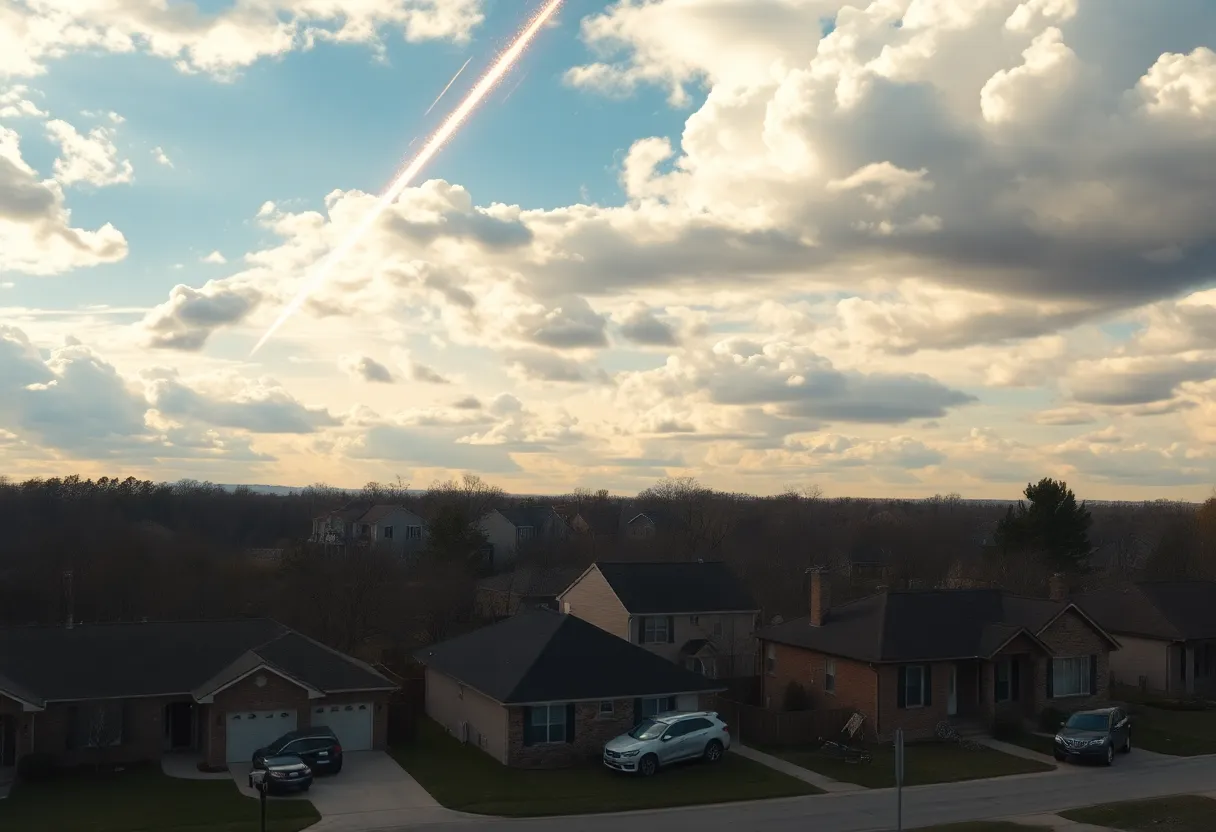News Summary
A stunning meteor fireball was observed across metro Atlanta and several southern states, creating a sonic boom and causing damage in Georgia. The meteor, classified as a bolide, was visible to many residents, with over 140 sightings reported. In McDonough, a piece penetrated a roof, leaving a sizeable hole. Despite the loud explosion, no seismic activity was detected. The event coincided with the Bootids meteor shower, highlighting the rare and beautiful occurrences in our atmosphere.
McDonough, Georgia – On Thursday afternoon, a bright meteor known as a “fireball” was sighted across metro Atlanta and several southern states, creating a noticeable sonic boom and reports of damage in Georgia. The phenomenon, classified as a bolide by experts from the American Meteor Society, drew attention from residents in states including South Carolina, North Carolina, and Tennessee.
The event began at approximately 12:25 p.m. ET, as noted by the International Meteor Organization. Shortly after, satellite data revealed a bright streak over the North Carolina and Virginia border, confirming the meteor’s presence in the atmosphere. Reports of the fireball poured in, with over 140 submissions received by the American Meteor Society within a 30-minute timeframe, showcasing its extensive visibility.
In McDonough, a piece of the meteorite is confirmed to have penetrated through the roof of a home, leaving an inch-wide hole. Residents across various neighborhoods, including Rockdale County and Snellville, reported hearing a loud explosion-like sound and feeling their houses shake due to the sonic boom created as the object entered the atmosphere. One resident recalled feeling significant rumbling and a dramatic shift in their home environment during the incident.
The National Weather Service and the U.S. Geological Survey provided additional information about the meteor event. Data indicated that the fireball exploded approximately 48 miles above Oxford, Georgia, after entering the Earth’s atmosphere at a speed of around 30,000 miles per hour. The explosion released energy equivalent to approximately 20 tons of TNT. Interestingly, the U.S. Geological Survey confirmed that no seismic activity was detected around the time of the explosion, ruling out the possibility that an earthquake caused the rumblings.
Among the witnesses, many took to social media to share videos and photos, documenting the fireball’s bright trail across the sky and its aftermath. Some residents reported property damage including cracked windows and structural concerns following the event, prompting officials in Anderson County, South Carolina, to investigate potential meteorite crash sites.
The phenomenon appears to correlate with the Bootids meteor shower, which was active during the time of the sightings. As defined by NASA’s Center for Near Earth Object Studies, bolides like this fireball are exceptionally bright meteors that can be observed over vast areas, making them a rare but fascinating occurrence.
Experts explain that meteors can decelerate significantly before making contact with Earth, although they can still be traveling at speeds up to hundreds of miles per hour. This specific meteor event, characterized as a “daytime fireball,” serves as a reminder of the stunning and powerful forces of nature that occasionally make their way to our planet.
This incident has not only sparked interest in the celestial event but also raised awareness regarding the implications of such natural occurrences within populated regions. As investigations continue into the aftermath and potential remaining debris from the meteor, residents are left with a remarkable story and an unforgettable observation of the majestic and occasionally disruptive nature of the cosmos.
Deeper Dive: News & Info About This Topic
HERE Resources
Daytime Fireball Lights Up Southeastern Skies
Spectacular Fireball Lights Up Southeastern Skies
Massive Meteor Causes Sonic Boom and Damage in North Georgia
Charleston Gears Up for Dazzling Meteor Showers This Fall
Additional Resources
- Fox Weather: Daytime Fireball Sighting Southeast June 2025
- Wikipedia: Fireballs
- The New York Times: Fireball in the Southeast
- Google Search: fireball meteor june 2025
- Newsweek: Fireball Reports Over Georgia and Surrounding States
- Encyclopedia Britannica: Meteor

Author: HERE Greenwood
The GREENWOOD STAFF WRITER represents the experienced team at HEREGreenwood.com, your go-to source for actionable local news and information in Greenwood, Greenwood County, and beyond. Specializing in "news you can use," we cover essential topics like product reviews for personal and business needs, local business directories, politics, real estate trends, neighborhood insights, and state news affecting the area—with deep expertise drawn from years of dedicated reporting and strong community input, including local press releases and business updates. We deliver top reporting on high-value events such as the Festival of Flowers, Greenwood Community Theatre performances, and agricultural showcases at the Greenwood County Fairgrounds. Our coverage extends to key organizations like the Greenwood Chamber of Commerce and the Greater Greenwood United Ministry, plus leading businesses in manufacturing and healthcare that power the local economy such as FujiFilm Manufacturing and Self Regional Healthcare. As part of the broader HERE network, including HERECharleston.com, HEREColumbia.com, HEREGreenville.com, and HEREHiltonHead.com, we provide comprehensive, credible insights into South Carolina's dynamic landscape.





